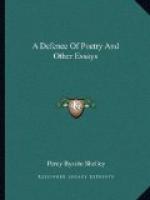and erotic delicacy in written poetry is correlative
with that softness in statuary, music and the kindred
arts, and even in manners and institutions, which distinguished
the epoch to which I now refer. Nor is it the
poetical faculty itself, or any misapplication of
it, to which this want of harmony is to be imputed.
An equal sensibility to the influence of the senses
and the affections is to be found in the writings of
Homer and Sophocles: the former, especially,
has clothed sensual and pathetic images with irresistible
attractions. Their superiority over these succeeding
writers consists in the presence of those thoughts
which belong to the inner faculties of our nature,
not in the absence of those which are connected with
the external: their incomparable perfection consists
in a harmony of the union of all. It is not
what the erotic poets have, but what they have not,
in which their imperfection consists. It is not
inasmuch as they were poets, but inasmuch as they
were not poets, that they can be considered with any
plausibility as connected with the corruption of their
age. Had that corruption availed so as to extinguish
in them the sensibility to pleasure, passion, and
natural scenery, which is imputed to them as an imperfection,
the last triumph of evil would have been achieved.
For the end of social corruption is to destroy all
sensibility to pleasure; and, therefore, it is corruption.
It begins at the imagination and the intellect as
at the core, and distributes itself thence as a paralysing
venom, through the affections into the very appetites,
until all become a torpid mass in which hardly sense
survives. At the approach of such a period, poetry
ever addresses itself to those faculties which are
the last to be destroyed, and its voice is heard,
like the footsteps of Astraea, departing from the
world. Poetry ever communicates all the pleasure
which men are capable of receiving: it is ever
still the light of life; the source of whatever of
beautiful or generous or true can have place in an
evil time. It will readily be confessed that those
among the luxurious citizens of Syracuse and Alexandria,
who were delighted with the poems of Theocritus, were
less cold, cruel, and sensual than the remnant of
their tribe. But corruption must utterly have
destroyed the fabric of human society before poetry
can ever cease. The sacred links of that chain
have never been entirely disjoined, which descending
through the minds of many men is attached to those
great minds, whence as from a magnet the invisible
effluence is sent forth, which at once connects, animates,
and sustains the life of all. It is the faculty
which contains within itself the seeds at once of
its own and of social renovation. And let us
not circumscribe the effects of the bucolic and erotic
poetry within the limits of the sensibility of those
to whom it was addressed. They may have perceived
the beauty of those immortal compositions, simply
as fragments and isolated portions: those who
are more finely organized, or born in a happier age,
may recognize them as episodes to that great poem,
which all poets, like the cooperating thoughts of
one great mind, have built up since the beginning of
the world.




